Daily Vocabulary Words: Enhance Your Lexicon with Leading Newspapers & Publications
Welcome to the Daily Vocabulary section at Wordpandit!
Our mission is straightforward: to bring you essential vocabulary words featured in top newspapers and publications worldwide. By focusing on words you’ll encounter in renowned sources, we aim to help you enhance your vocabulary effectively and practically.
Our selection includes words from:
– The New York Times
– The Washington Post
– Scientific American
– BBC
– The Guardian
– Psychology Today
– Wall Street Journal
– The Economist
– The Hindu
– The Times of India
– The Economic Times
– Hindustan Times
– Live Mint
– The Indian Express
– And many more.
We are committed to your vocabulary development. Simply visit this section regularly and explore the daily posts. This is your go-to repository for commonly used words, providing significant practical benefits by familiarizing you with vocabulary from the leading publications listed above.
Make it a habit to visit our website daily and expand your lexicon with words from top newspapers and publications. (edited)
WORD-1: RECONCILED
CONTEXT: The welfarist and the liberal – can be reconciled more creatively in the future than they have been in the past.
SOURCE: The Guardian
EXPLANATORY PARAGRAPH: Imagine you had a fight with your friend, but then you both said sorry and became friends again. Reconciled means to make up and be friends again after a disagreement.
MEANING: Made peace or became friends again after a disagreement (verb).
PRONUNCIATION: REK-un-syld
SYNONYMS: Made up, resolved, settled, harmonized, reunited, mended
USAGE EXAMPLES:
1. After their argument, they reconciled and were happy again.
2. The brothers reconciled after years of not speaking.
3. She reconciled with her old friend after their misunderstanding.
4. They reconciled their differences and worked together.
WORD-2: THREADBARE
CONTEXT: Would be better employed rethinking their doctrines than trying to win the party to what are, by now, rather threadbare ideas.
SOURCE: The Guardian
EXPLANATORY PARAGRAPH: Imagine your favorite teddy bear has been hugged so much that its fur is worn out and thin. Threadbare means something is so old and worn out that it looks thin and shabby.
MEANING: So old and worn out that it looks thin and shabby (adjective).
PRONUNCIATION: THRED-bair
SYNONYMS: Worn, shabby, frayed, tattered, ragged, dilapidated
USAGE EXAMPLES:</STRONG:
1. His jacket was threadbare from years of use.
2. The carpet in the old house was threadbare.
3. She loved her threadbare blanket even though it was old.
4. The threadbare sofa needed to be replaced.
WORD-3: INCITING
CONTEXT: The inciting incident then sets the parameters of all the discussion to follow.
SOURCE: The Guardian
EXPLANATORY PARAGRAPH: Imagine someone telling others to join them in causing trouble or doing something bad. Inciting means encouraging or stirring up trouble or bad behavior.
MEANING: Encouraging or stirring up trouble or bad behavior (verb).
PRONUNCIATION: in-SY-ting
SYNONYMS: Provoking, instigating, stirring up, spurring, agitating, fomenting
USAGE EXAMPLES:</STRONG:
1. The speech was accused of inciting violence.
2. He was arrested for inciting a riot.
3. Inciting fear among the crowd was not acceptable.
4. The leader’s words were seen as inciting rebellion.
WORD-4: CURRICULUM
CONTEXT: I doubt the phrases “defund the police” or “decolonise the curriculum” would have generated the same support.
SOURCE: The Guardian
EXPLANATORY PARAGRAPH: Imagine a list of all the fun activities and lessons you will learn at school this year. A curriculum is a plan that shows all the subjects and topics you will study in school.
MEANING: A plan that shows all the subjects and topics to be studied in school (noun).
PRONUNCIATION: kuh-RIK-yuh-lum
SYNONYMS: Syllabus, course, program, study plan, educational plan, coursework
USAGE EXAMPLES:</STRONG:
1. The school introduced a new curriculum this year.
2. The curriculum includes math, science, and history.
3. Teachers follow the curriculum to plan their lessons.
4. The curriculum was designed to be engaging and educational.
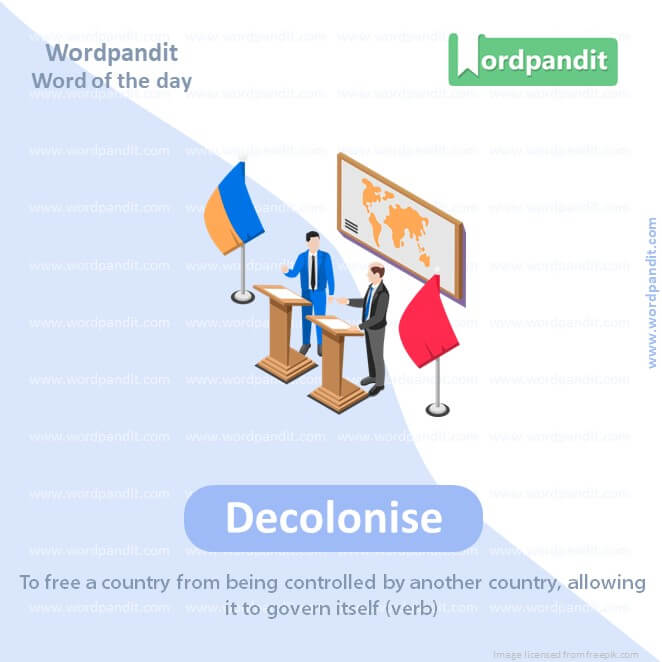
WORD-5: DECOLONISE
CONTEXT: I doubt the phrases “defund the police” or “decolonise the curriculum” would have generated the same support.
SOURCE: The Guardian
EXPLANATORY PARAGRAPH: Imagine taking back control of your own toys after someone else has been telling you how to play with them. Decolonise means to give control back to the original people and remove the influence of others who took over.
MEANING: To free a country from being controlled by another country, allowing it to govern itself (verb)
PRONUNCIATION: dee-KOL-uh-nize
SYNONYMS: Liberate, free, emancipate, restore, return, reclaim
USAGE EXAMPLES:</STRONG:
1. The country worked to decolonise its education system.
2. Efforts to decolonise involved returning land to its original owners.
3. Decolonise the curriculum to include native perspectives.
4. The movement aimed to decolonise and promote independence.
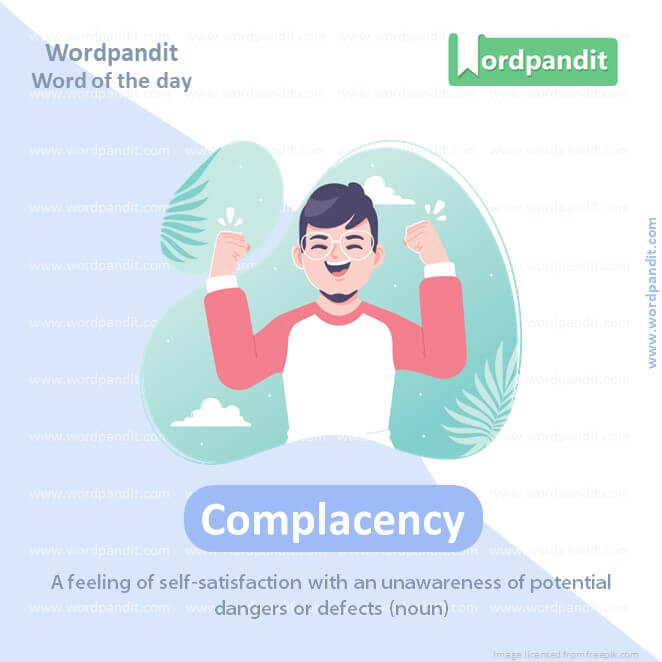
WORD-6: COMPLACENCY
CONTEXT: The price of this complacency is already being paid in Ukrainian blood.
SOURCE: The Guardian
EXPLANATORY PARAGRAPH: Imagine feeling so comfortable and satisfied with what you have done that you stop trying to do better. Complacency means being too satisfied with yourself and not wanting to improve.
MEANING: A feeling of self-satisfaction with an unawareness of potential dangers or defects (noun)
PRONUNCIATION: kum-PLAY-sen-see
SYNONYMS: Self-satisfaction, smugness, contentment, self-approval, self-admiration, overconfidence
USAGE EXAMPLES:</STRONG:
1. Complacency can lead to mistakes if you’re not careful.
2. She warned against complacency in achieving goals.
3. His complacency made him ignore potential problems.
4. The team lost due to their complacency after early success.
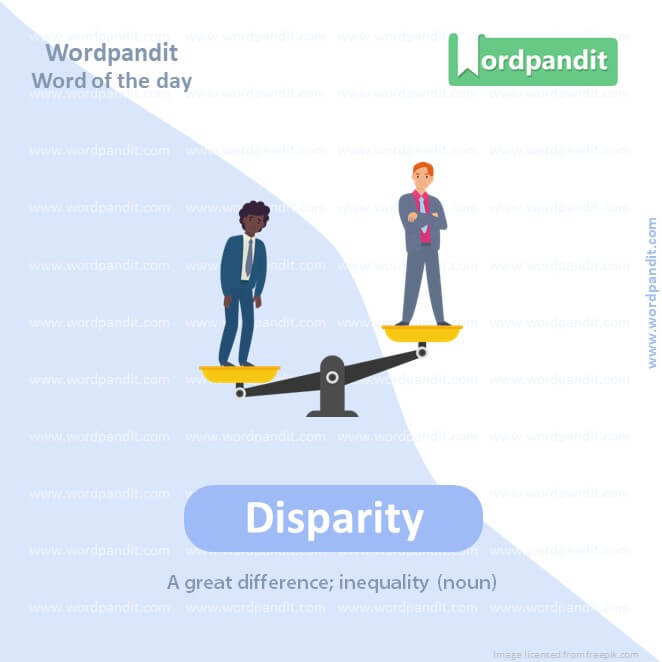
WORD-7: DISPARITY
CONTEXT: Artillery isn’t everything, but the disparity speaks to Ukraine’s relative shortage of materiel, evident in other areas such as the number of drones it can field.
SOURCE: The Guardian
EXPLANATORY PARAGRAPH: Imagine two kids getting very different amounts of candy, with one getting a lot and the other getting just a little. Disparity means a big difference between things that should be equal.
MEANING: A great difference; inequality (noun)
PRONUNCIATION: dis-PAIR-uh-tee
SYNONYMS: Inequality, difference, gap, imbalance, discrepancy, divergence
USAGE EXAMPLES:</STRONG:
1. There is a disparity in income between the rich and the poor.
2. The disparity in test scores worried the teachers.
3. The company is addressing the disparity in pay among employees.
4. Disparity in healthcare access is a major issue.
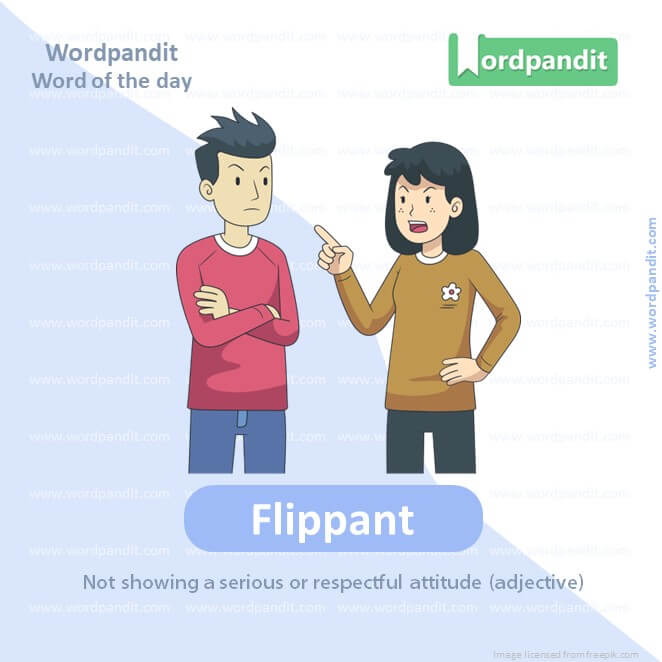
WORD-8: FLIPPANT
CONTEXT: Despite the flippant observation – often made by European officials – that Russia’s economy is the same size as that of Italy, the Kremlin is producing more shells than all of NATO.
SOURCE: The Guardian
EXPLANATORY PARAGRAPH: Imagine someone making a joke about something serious when they should be paying attention. Flippant means not taking something serious seriously and being a bit rude about it.
MEANING: Not showing a serious or respectful attitude (adjective)
PRONUNCIATION: FLIP-uhnt
SYNONYMS: Disrespectful, dismissive, frivolous, cheeky, irreverent, glib
USAGE EXAMPLES:</STRONG:
1. His flippant remarks during the meeting were not appreciated.
2. She gave a flippant answer to a serious question.
3. The teacher didn’t like his flippant attitude.
4. Flippant comments can hurt people’s feelings.
WORD-9: FEASIBLE
CONTEXT: Ensuring Russia’s defeat in Ukraine is feasible, but it requires some important steps.
SOURCE: The Guardian
EXPLANATORY PARAGRAPH: Imagine you want to build a tall tower
with blocks, and you see that you have enough blocks to make it happen. Feasible means something that can be done easily or is possible to do.
MEANING: Something that can be done easily or is possible to do (adjective).
PRONUNCIATION: FEE-zuh-bul
SYNONYMS: Possible, achievable, doable, practical, attainable, viable
USAGE EXAMPLES:</STRONG:
1. It’s feasible to finish the project by Friday.
2. They discussed whether the plan was feasible.
3. The idea seemed feasible and worth pursuing.
4. It’s not feasible to travel to the moon in one day.
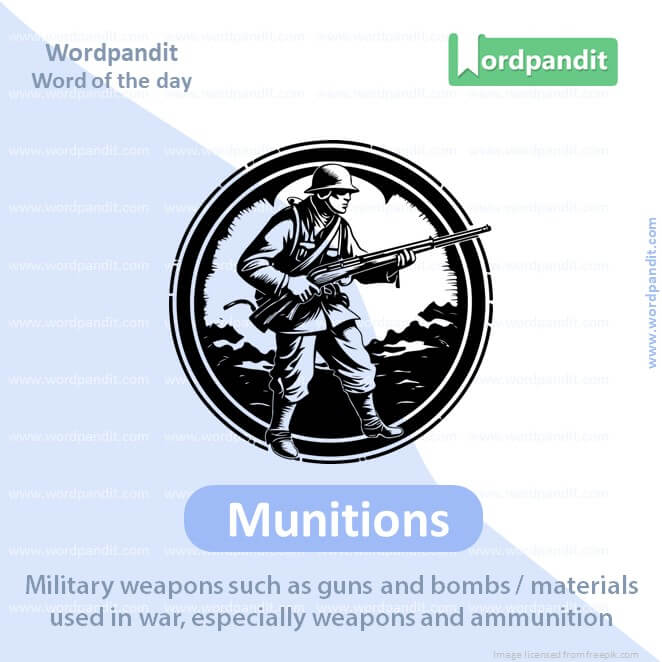
WORD-10: MUNITIONS
CONTEXT: Many of the munitions provided since the beginning of the war were purchased from the international market or drawn from stockpiles, and investment in European production has been slow.
SOURCE: The Guardian
EXPLANATORY PARAGRAPH: Imagine a toy soldier with tiny toy weapons. Munitions are materials like bullets, bombs, and other items used in fighting.
MEANING: Military weapons such as guns and bombs/ materials used in war, especially weapons and ammunition
PRONUNCIATION: myoo-NISH-uns
SYNONYMS: Ammunition, arms, weapons, ordnance, armaments, explosives
USAGE EXAMPLES:</STRONG:
1. The soldiers loaded their munitions before the battle.
2. Factories produce munitions for the military.
3. They stored the munitions in a safe place.
4. The army ran out of munitions during the conflict.
Vocabulary Today
In the dynamically evolving spectrum of language, staying updated with ‘vocabulary today’ is an integral part of mastering a language. These topical, contemporary words breathe vitality into our communication, bridging the gap between language learning and language living. But, how can we effectively learn ‘vocabulary today’?
Grasping ‘vocabulary today’ begins with exposure to contemporary contents. Engaging with current publications, social media platforms, movies, music, podcasts, and digital content can dive you into the real-world usage of ‘vocabulary today’. These platforms imbibe the vocabulary of the day, reflecting the evolution in language.
To consolidate the learning of ‘vocabulary today’, utilize memory-enhancing tools. Flashcards, language learning apps, or memory-enhancement software can make your study session an engaging venture and enhance word retention.
However, the secret sauce to learning ‘vocabulary today’ is practice. Inculcating these words in your regular dialogues, written correspondences, or social media posts will reinforce your grasp over these words. It brings you closer to ‘vocabulary today’, enhancing your language adaptability and fluency.
Better understanding of ‘vocabulary today’ can be achieved by staying connected with diverse social platforms which bring words from across locations and cultures, expanding your linguistic understanding. Also, participating in language forums, discussion groups, or language exchange platforms provides great insights into ‘vocabulary today’.
In the final analysis, staying abreast with ‘vocabulary today’ is an exciting quest that requires consistent exposure, active practice, and social engagement. As you embrace this journey, you will find your language proficiency growing with every new word, enabling you to step into the dynamic world of contemporary language with confidence and mastery. Remember, ‘vocabulary today’ is not static, it flows like a river, always fresh, always changing, and always enriching!













